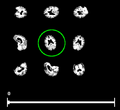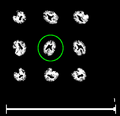Difference between revisions of "2014 Summer Project Week:Intelligent Steering"
From NAMIC Wiki
| (2 intermediate revisions by the same user not shown) | |||
| Line 2: | Line 2: | ||
<gallery> | <gallery> | ||
Image:PW-MIT2014.png|[[2014_Summer_Project_Week#Projects|Projects List]] | Image:PW-MIT2014.png|[[2014_Summer_Project_Week#Projects|Projects List]] | ||
| − | + | Image:Steered_rotations0_h.png| 2D slice views of fixed image using different PCA axis combinations | |
| − | Image: | + | Image:Steered_rotations1_h.png| 2D slice views of moving image using different PCA axis combinations |
</gallery> | </gallery> | ||
| Line 21: | Line 21: | ||
<div style="width: 27%; float: left; padding-right: 3%;"> | <div style="width: 27%; float: left; padding-right: 3%;"> | ||
<h3>Approach, Plan</h3> | <h3>Approach, Plan</h3> | ||
| − | * Investigate data exploration techniques for highlighting | + | * Investigate data exploration techniques for highlighting common registration errors (local rotation, shift, and scaling) |
* Implement efficient, responsive extensions using the Slicer 4 Python extension platform and PyOpenCL | * Implement efficient, responsive extensions using the Slicer 4 Python extension platform and PyOpenCL | ||
</div> | </div> | ||
Latest revision as of 04:18, 27 June 2014
Home < 2014 Summer Project Week:Intelligent SteeringKey Investigators
- Marcel Prastawa, GE
- Jim Miller, GE
- Steve Pieper, Isomics
Project Description
Steered image registration in Slicer using intelligent interaction rather than direct interaction where user specifies deformation changes.
Objective
- Develop interaction schemes that allows users to indicate incorrect regions
- Provide intelligent interfaces so users provide minimal interaction without detailed control of image deformations
Approach, Plan
- Investigate data exploration techniques for highlighting common registration errors (local rotation, shift, and scaling)
- Implement efficient, responsive extensions using the Slicer 4 Python extension platform and PyOpenCL
Progress
- Testing the use of robust PCA for providing hints on rotational misalignment
- Investigating the modeling of appropriate correction steps given the possible misalignments


